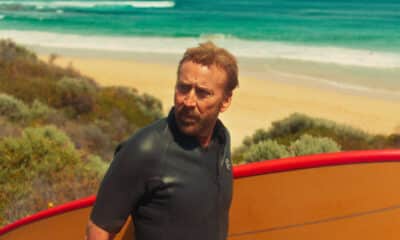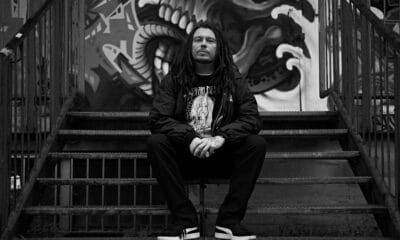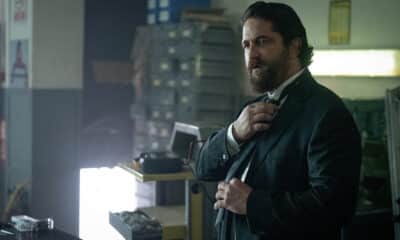Damian Hurley has grown up on the set of his mother Elizabeth Hurley’s projects. This upbringing has clearly inspired him as now, aged just twenty-two, he has made his first feature, Strictly Confidential. Hurley both wrote and directed the film, which sees a group of beautiful people uncover disturbing secrets on the anniversary of one of their number’s death.
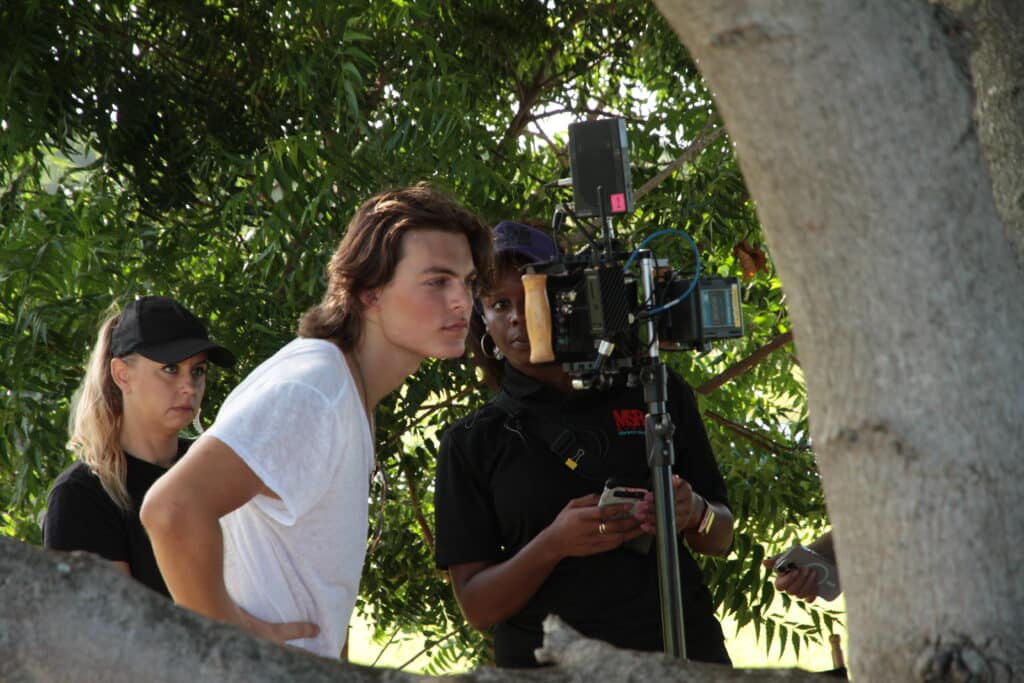
Although better known for his famous mother, Damian has spent the last few years working as both an actor and model. His heart though has been stolen by life behind the camera, and directing his first feature is something that Hurley has been working towards since he was very young. Now, Strictly Confidential is out in the world and available to watch via digital. Ahead of the release, THN spoke with Damian to find out more about his journey from film lover to creator,
Due to your mother’s work you’ve obviously grown up around the film industry; at what point did you decide you wanted to go into the family business?
I’ve been on sets my whole life and have been so inspired by every aspect of this industry from such a young age. When I was given my first camcorder when I was 8, I started making little short films, torturing every long suffering family member and friend I could get my hands on to be in them. I bought myself a director’s megaphone, a massive one. They all just very loyally went along with whatever mad schemes I came up with that day. Since then it’s just grown and grown.
What was it out of all of the various roles that drew you to directing and writing?
There’s something incredibly cathartic about writing, and there’s something really freeing about directing. Putting anything out into the world creatively has the potential to be terrifying, but I think there’s just something about this industry as a whole…there’s nothing like it. It’s just a magical world. When you watch something – you remember La La Land? – it takes us full scale into the movie world, that’s one of the few films that manages to capture really what it is like to be on a set. It can be terrifying, it’s the hurry up and wait game, you can be unemployed and desperately trying to get a job in the industry for years and years and suddenly the biggest part in the world drops in your lap overnight. It’s this unpredictable, mad industry where everyone has potential to take over the world.
Like many of us, your life has been affected by suicide, and it was an early experience which in part began the idea for Strictly Confidential. Did creating this story help you process your own grief?
Subconsciously, a lot more than an active channelling of grief. I didn’t realise until it came to doing press and people began drawing conclusions between the film and some things that have happened in my real life, quite how intense the similarities were. Somehow that had passed me by.
Strictly Confidential is an independent film, and as such the shoot was tight, just under three weeks. Given that this was your feature debut, do you think that the constricted production time helped you, potentially cutting out the chance to overthink anything?
It’s interesting. I grew up on a lot of TV sets, shows that my mum would do, so I’m quite familiar with people working insanely fast. On a show you’ve got eight days for an episode and every single second counts. So in a funny little way that [the tight shoot] wasn’t such a leap. But I’m a self proclaimed perfectionist and I would love one day to do something where the budget allowed for a day to shoot someone getting out of a car perfectly. Sadly, on this we maybe had something like thirty minutes to get a shot like that.
It was important that for my first feature I didn’t have hundreds of millions of budget and all the time in the world. We didn’t have a lot of money, we didn’t have a lot of time. So yeah, you have to get on board with making decisions much faster. You don’t have the luxury of “maybe if we reshoot that” – we didn’t have any reshoots at all.
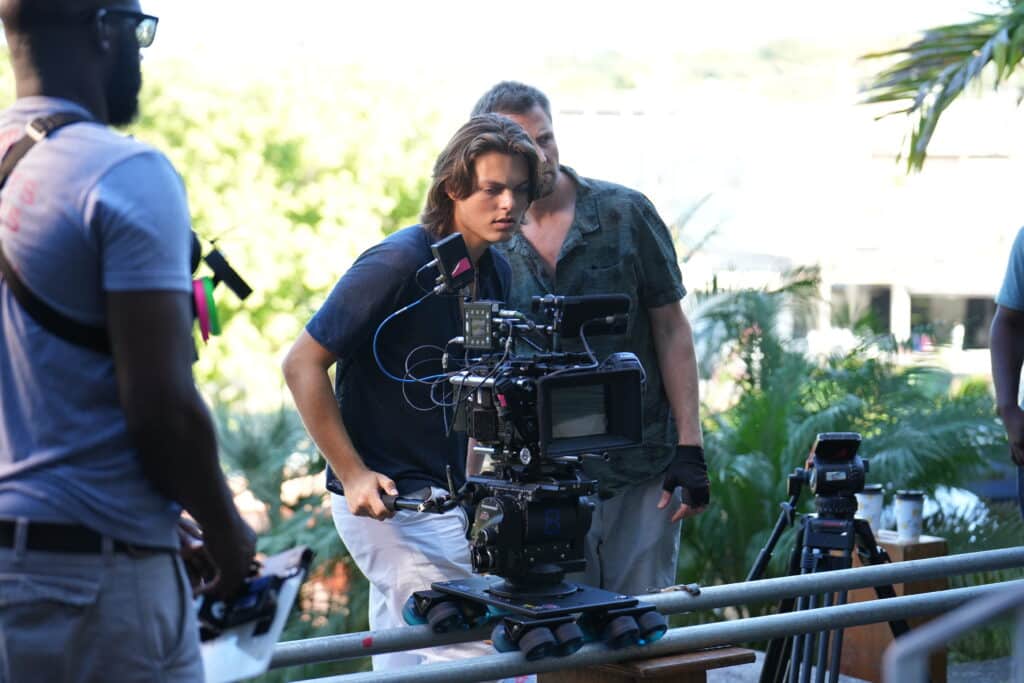
As in your short film, The Boy on the Beach, in Strictly Confidential you get to enact most children in that you get to turn the table on your parents and tell them what to do. You and your mother clearly have a very strong bond, how was it working with her?
I’ve got to say it was a truly amazing experience. I’m so in awe of my mum as a professional. And working in such close proximity to someone I admire so much was just so inspiring, and equipped me I feel, for the rest of my career. I think when you have a twin-like telepathy with someone, when you’re working with family – everyone’s always against working with family – but I actually love it because you can be so much more direct, and less polite and careful than with anyone who isn’t an immediate blood relative.
My mum came on board as producer creatively because I wanted someone totally Team Damian, and she didn’t have to mollycoddle and look after the creative mad director in gently suggesting, she could just say, “we don’t have time.” It was a very interesting dynamic, and I think it made everything go much faster and much more productive.
Currently there is a debate about the importance of sex in cinema. Your film obviously covers sexuality in all varieties, albeit in a more erotic way than straight nudity. What are your thoughts on the need to keep these scenes in movies?
I think when handled correctly, sex on screen is important. Sex is one of the very few universal experiences in the world that everyone can experience and relate to. I think with this film it was very important to me, especially as it’s my first film, and especially as it’s a film by a young adult, starring young adults, for young adults, that there was nothing that could be construed as exploitative, and there isn’t. I had no-nudity clauses put into everyone’s contracts so there’s no nudity, nothing gratuitous. There are hardly any sex scenes, in fact there isn’t really a sex scene. The seldom ‘sex’ scenes are half dream, montage, or flashback.
We can all see on screen when a sex scene has been thrown in for sex sake, or someone puts them in for any reason other than story. I think I’ve been very lucky with this film that anyone who has actually seen this film has said that every single scene is vitally important to the story and symbolises betrayal rather than people having sex just to have sex.
I also love movies being movies and just being beautiful. We’re all perfectly capable of seeing real life; we live and breathe it everyday. There’s a time and place for realism in cinema and with this I did want to create a really beautiful world so that everything dark and dangerous, these betrayals happening beneath the surface, was unexpected. We start seeing the film and we see this beautiful exterior and then slowly, slowly, slowly secrets begin to sneak through the cracks, and we begin to realise that underneath the beautiful exterior is a very dark truth lurking. I really like that contrast.
With feature film number one under your belt, what’s the plan going forward? Do you have an idea for film number two or any genres you’d like to tackle next?
I have yeah. It’s a very exciting film. It’s a project coming up with me as writer and director. It’s in very early stages and there’s a gag order on it now, so I’m not allowed to say much other than it is very exciting and is completely different to this film.
Strictly Confidential is out now on Digital.
Kat Hughes is a UK born film critic and interviewer who has a passion for horror films. An editor for THN, Kat is also a Rotten Tomatoes Approved Critic. She has bylines with Dread Central, Arrow Video, Film Stories, and Certified Forgotten and has had essays published in home entertainment releases by Vinegar Syndrome, Arrow and Second Sight. When not writing about horror, Kat hosts micro podcast Movies with Mummy along with her six-year-old daughter.

Latest Posts
-
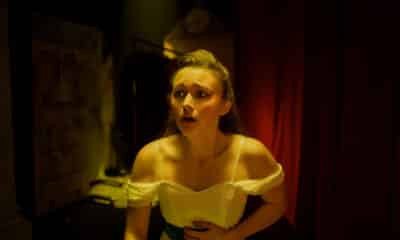

Film Reviews
/ 13 hours ago‘Fear Street: Prom Queen’ review: Dir. Matt Palmer (2025)
It has been four years since Leigh Janiak’s Fear Street trilogy took horror fans...
By Kat Hughes -
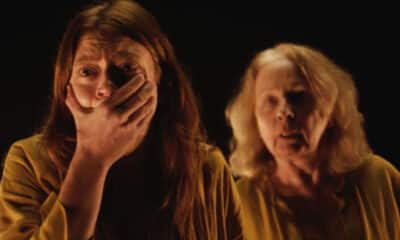

Film Reviews
/ 14 hours ago‘The Surrender’ review: Dir. Julia Max (2025)
As Julia Max’s debut feature, The Surrender, unfolds, the inspirations for the film become...
By Kat Hughes -
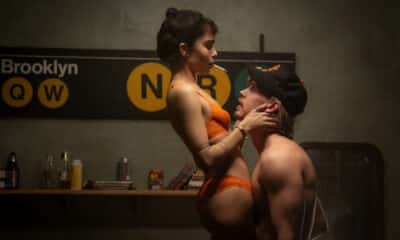

Film Trailers
/ 2 days agoFirst trailer for Darren Aronofsky’s ‘Caught Stealing’
Sony Pictures has released the debut trailer for Darren Aronofsky’s new film Caught Stealing,...
By Paul Heath -
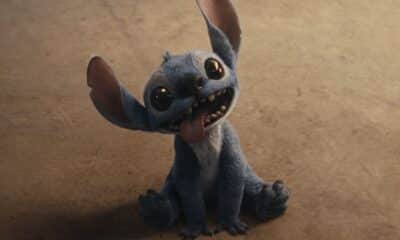

Film Reviews
/ 3 days ago‘Lilo and Stitch’ review: Dir. Dean Fleischer Camp (2025)
Director Dean Fleischer Camp won audiences over with the fantastic Marcel the Shell with...
By Kat Hughes
